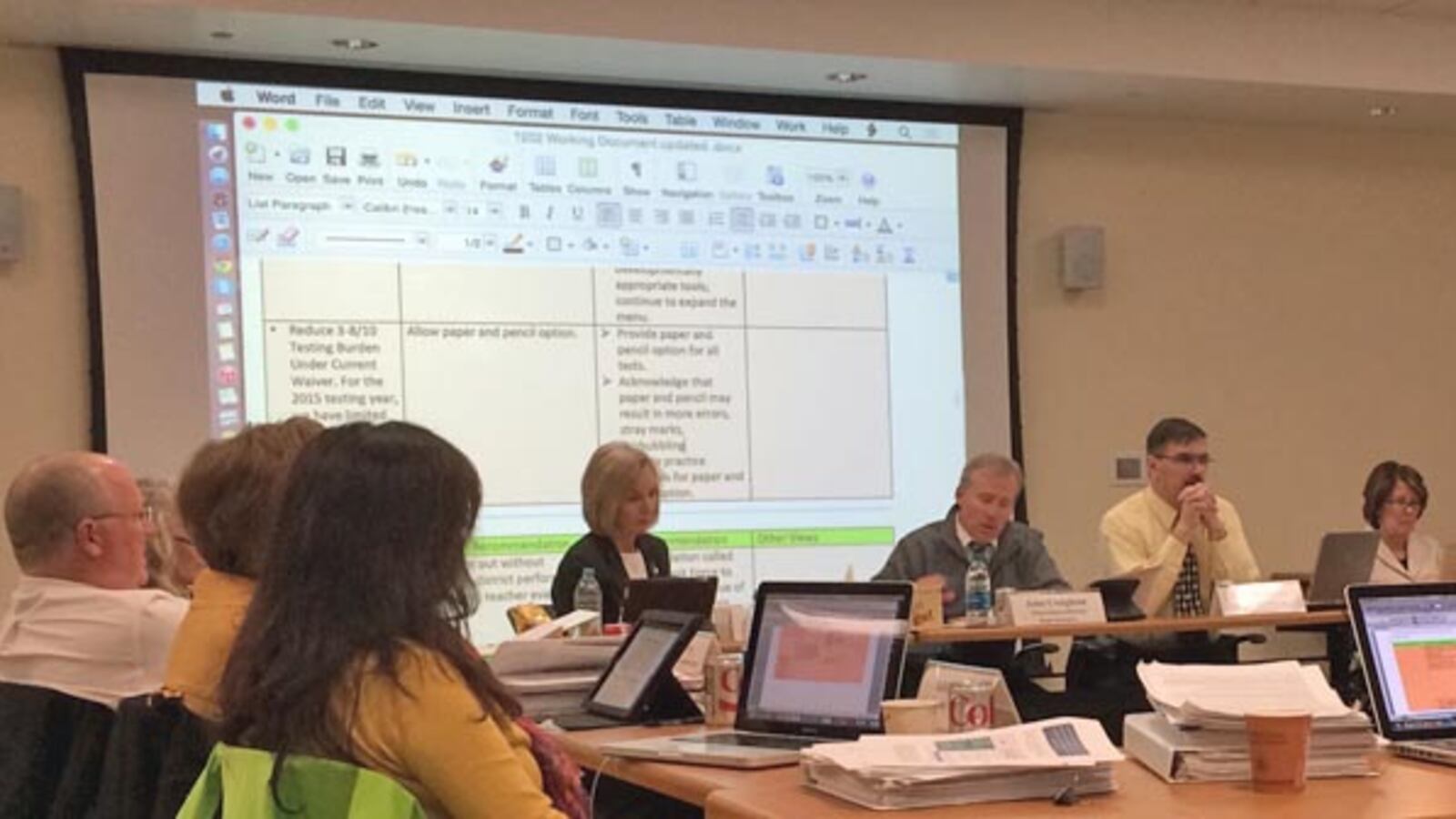In its final meeting Monday, the state’s testing task force firmed up recommendations for cutbacks in some high school testing and for streamlining of assessments and evaluations in the earliest grades.
The group couldn’t reach agreement on what should be done with social studies tests and with 9th grade language arts and math tests. Nor were its members of one mind about how the state should help districts with the costs of technology needed for new online tests.
The task force isn’t recommending that the testing schedule be changed for this spring or that the legislature mandate changes in local testing.
As the meeting ended, chair Dan Snowberger said, “What this [the group’s work] has represented to me is the real complexity of this issue.” Given that, he added, he hopes “the legislature doesn’t see the limited change we can suggest … as a loss.” Snowberger is superintendent of the Durango schools.
“I feel like we’ve done as much as we can,” said task force member Syna Morgan, a Jeffco administrator.
The Standards and Assessments Task Force didn’t leave Monday’s session with final report language in place. Subgroups of the 15-member body will edit sections of the draft completed Monday, then each member will have the opportunity to comment on the whole document. The panel will review changes during a Jan. 23 conference call, with a Jan. 26 deadline for finishing the report.
Given the group’s propensity for word-smithing, it’s likely there will several changes in language.
Members of the group are scheduled to present their report to lawmakers on Jan. 28.
The task force is recommending that language arts and math tests continue in grades 3-8 and in grade 10. Junior-year tests in those subjects would be made optional, and 12th grade tests in social studies and science would be eliminated. The task force also is recommending streamlining some of the assessments and evaluations used to determine school readiness and reading ability in K-3 students. For instance, students who demonstrate grade-level reading wouldn’t have to be retested during the same school year.
The group will propose there be a one-year timeout in state ratings of schools to avoid schools or districts being penalized if significant numbers of students opt out of this spring’s tests. The panel also agreed that if a ratings timeout is approved, the state needs to provide clear, factual to districts and parents on what that means.
Despite apparent agreement during a Friday meeting, the group split Monday in a rare show-of-hands vote on whether 9th grade language arts and math tests should be eliminated. The report will reflect that division.
The group’s division over whether to continue 4th and 7th grade social studies tests or make them optional also will go into the report.
Late Monday morning, the group also seemed ready to split on other high school testing changes.
After a break for lunch, Snowberger said, “It does feel like we’re starting to revisit, we’re starting to backpedal.” The panel decided to leave the recommendations as they were.
Members also spent considerable time Friday and Monday morning discussing more extensive changes to testing, which might be possible if and when federal requirements change. The possibilities include adaptive assessments (tests that get harder or easier depending on a student’s answers), flexibility for districts to use their own tests, state tests that combine several subjects, and streamlining annual testing so that students wouldn’t take tests in multiple subjects each year.
But the group made no recommendations – “There are unresolved tensions in the group,” noted Bill Jaeger of the Colorado Children’s Campaign – and decided those issues are best left to some future study group.
In closing comments members complimented one another, but a couple were critical of the legislature for lack of diversity on the group. The panel, appointed by legislative leaders and the chair of the State Board of Education, had one Hispanic member and no African Americans. Tony Lewis of the Donnell-Kay Foundation called that “immoral if not unjust.”
Lewis and task force facilitator Laura Lefkowits also chided lawmakers for not providing any funding for the task force. (The only funding was for an outside study of testing impacts.)


